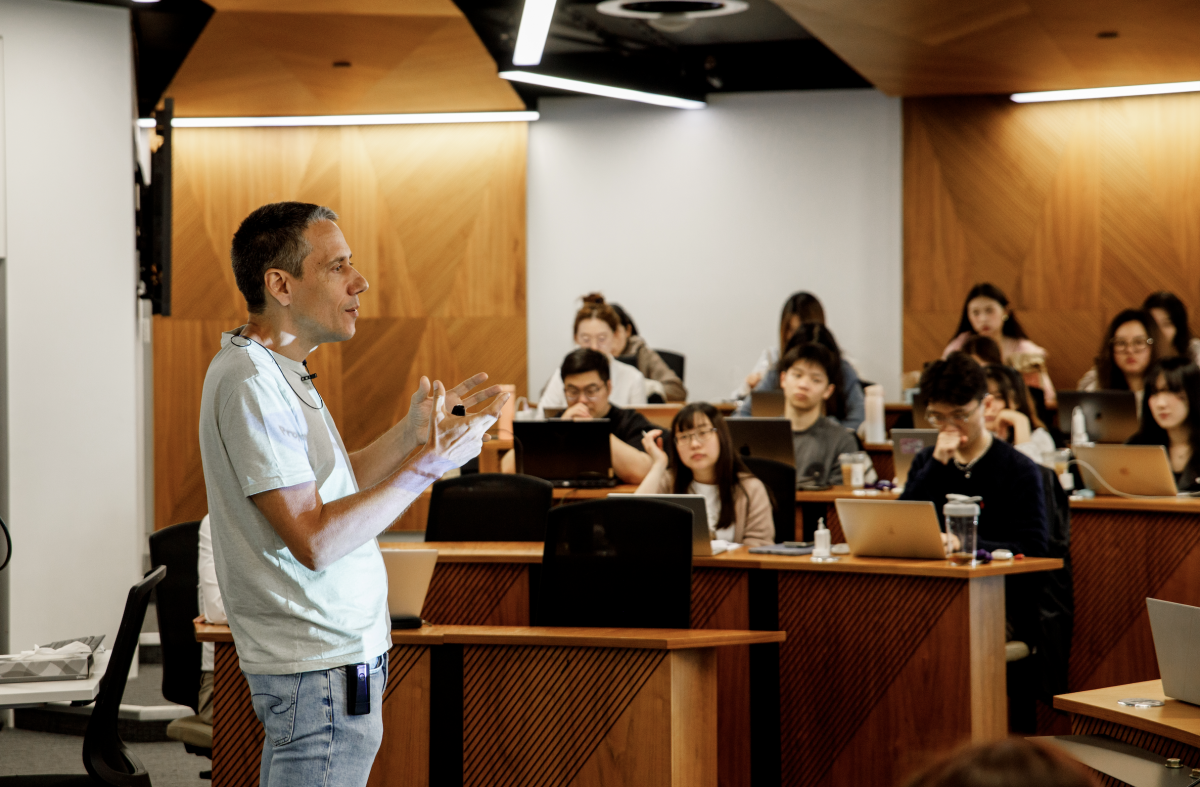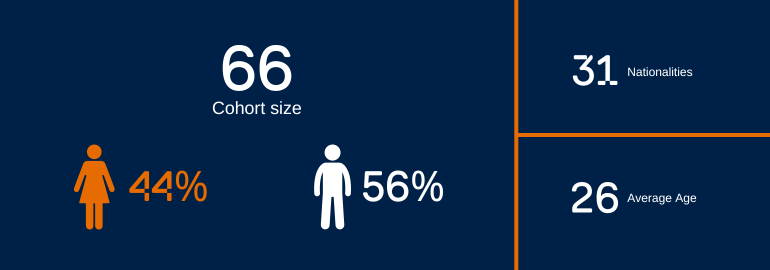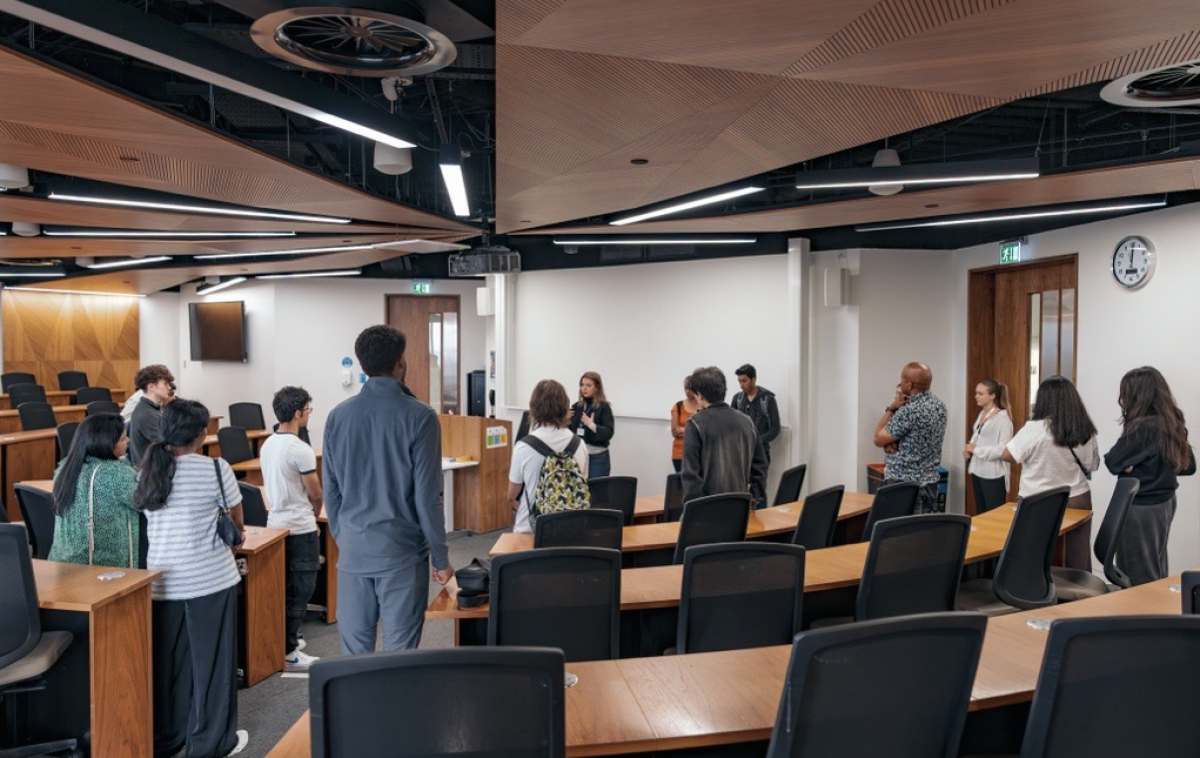Overview
Start date: September 2026
Duration: 12 months full-time, or 24 months part-time
Fees for September 2026 intake: Home students: £21,500, Overseas: £42,700. Scholarships available.
Application deadline: Open on 20th October 2025 and close on 26th June 2026 at 5pm UK time for applicants who require a visa; and on 28th August 2026 for those who do not.
Entry: Minimum of 2:1 honours or equivalent in a relevant discipline. International students, please note that UCL’s English language requirement for this programme is a ‘Level 2’ - further details regarding this can be found at the UCL English Language Requirements page.
Location: This programme is delivered at our Canary Wharf campus.
Apply to MSc Entrepreneurship Full-Time
Apply to MSc Entrepreneurship Part-Time
Postgraduate Open Evening February 2026
Visit our Canary Wharf campus this February, Friday 20 to explore the UCL School of Management MSc and MBA programmes, speak with staff and students, and find the right route for your future in business.
Programme
The MSc Entrepreneurship at UCL School of Management is designed for students who intend to start and run high-impact, ‘for-profit’ innovative businesses.
Right from the start of the programme, you will learn the skills and gain the tools to start an innovative, high-impact, new business.
From the first few weeks, you will be interviewing prospective customers, and subsequently learn how to do ‘rapid prototyping’, using the tools of ‘lean’ entrepreneurship, and pitching new ideas. Using UCL’s networks and reputation as a starting point to access London’s thriving entrepreneurship scene, you will find or develop a founding team and learn how to raise investor finance, or ‘bootstrap’ your business. This programme is about creating ‘for-profit’ enterprises which are committed to the principles of sustainable capitalism.
This programme was the first of its kind in Europe, for its single-minded focus on giving you the knowledge, skills, and network to start up a business successfully. We pride ourselves on our rate of successful start-up creation, and every year work to launch more successful start-ups.
On this programme, you will find yourself among like-minded students who will be your allies during your studies – and in some cases, the co-founders with whom you will establish your future business. A selection of start-ups from the programme can be found on our Hall of Fame website.
An exciting study abroad option is available to our students at Singapore Management University (SMU) for Term 2 on their equivalent to our programme, MSc Entrepreneurship and Innovation. This option allows students to study at an additional prestigious academic institution and simultaneously gain experience of Singapore’s dynamic start-up ecosystem and Asian culture. The option is available to both full-time and part-time students. Students are selected during Term 1 based on a short personal statement. This study option cannot be guaranteed to applicants joining the degree. For further information on the SMU study option, please email David Gomulya at dgomulya@smu.edu.sg. Support funding is available through the Turing Scheme, subject to status.
The latest rankings from the Complete University Guide (2025) place UCL School of Management 5th (out of 124) in the UK for Business and Management Studies.
The UCL School of Management is proud to be in the 6% of business schools with AACSB accreditation - a global mark of excellence that recognises our commitment to innovative, research-led teaching, rigorous academic standards, and preparing students for impactful global careers in business and management.
Who is this Programme For?
This MSc is designed for individuals who:
- Wishes to start a business now. We can help you with the development of your idea and introduce you to the London business community.
- Wishes to start a business at a later date, possibly in your home country if a foreign student. We can teach you the skills of researching and developing business ideas.
- Wishes to work in the venture creation and funding arena.
If you have studied management or entrepreneurship at the undergraduate level, you may find some concepts familiar, but our distinctive approach and elective choices allow personalisation and deeper specialisation.
Formerly “MSc Technology Entrepreneurship,” the renaming reflects the near-universal role of technology in startups today.
Those interested in traditional corporate management who do not want to start a business may find the MSc Management more suitable.
Notes
- It is possible to take the programme part-time over two years. For 2024/25, around 15% of students were part-time, which has allowed them to continue working whilst studying.
- This MSc is heavily over–subscribed each year and has limited spaces available. You are advised to apply early.
- Unless taking the degree as a part-time student over two years, remaining in employment whilst studying full-time is not recommended.
- The programme is very suitable for entrepreneurial candidates who have not studied management previously. We actively seek a diverse cohort in terms of undergraduate degrees and regularly have students with arts or engineering backgrounds.
- We are entirely sector-agnostic and welcome all start-up ideas committed to the general principles of sustainable capitalism.
- If you have studied management and/or entrepreneurship at the undergraduate level, it is likely that some concepts may be repeated. However, our approach to topics may be different, and there is a varied range of core modules. In addition, the choice of two elective modules allows some personalisation of your degree.
- The MSc Entrepreneurship was formerly called MSc Technology Entrepreneurship. The name change has reflected the fact that technology is now a feature of almost every start-up business.
Programme Structure
The programme structure for 2024/2025 comprises the following. Please check this page again in early 2025 for the 2025/26 structure.
|
Term 1: late September-December 2024 |
Term 2: January-March 2025 |
|
Required: MSIN0235 Building High-Impact Founders MSIN0070 Building High Impact Ventures |
Required: MSIN0087 Product Development and Prototyping MSIN0099 Entrepreneurial Marketing Strategy and Branding Optional Modules (students select two modules, one of which must be from group A): Group A MSIN0069 Managing Scaling Ventures MSIN0091 Retail and Consumer Entrepreneurship MSIN0098 Technology Entrepreneurship MSIN0261 Building Sustainable Ventures Group B |
| Term 3: April-September 2025 MSIN0139 Dissertation | |
Optional Modules
All students select two of seven specialist modules, aimed at giving more domain-specific knowledge, networks, and skills. Some of these optional modules will be taught with students from other School of Management master’s programmes, thus providing further opportunities for student interaction across the school.
Please note that the list of modules given here is indicative. This information is published a long time in advance of enrolment, and module content and availability are subject to change. Modules that are in use for the current academic year are linked for further information. Where no link is present, further information is not yet available. For questions about optional modules, please reach out to us at: mgmt-e@ucl.ac.uk
Students select their chosen optional modules during Term 1, and they are taught in Term 2.
In Term 3, and up to early September 2027, students will develop a dissertation project with a supervisor from within the UCL School of Management. The project allows students to work full-time on developing their start-up or to conduct research-based field investigations of the desirability, feasibility, and viability of a business opportunity. The dissertation project is documented in a 12,500-word report.
Time Commitment
The programme is delivered through a combination of lectures, seminars, and class discussions. Students are given the opportunity to attend weekly lectures given by leading academics, entrepreneurs and venture capitalists. Assessment is through coursework, presentations, examinations, and the dissertation.
Full-time students study four modules in Term 1 and four modules in Term 2, of which two are optional. In Term 3, students undertake a supervised dissertation project.
Each taught module is delivered over 10 weeks, with three contact hours per week comprising lecture content and interactive components.
In addition, students spend approximately 7-12 hours a week on each module on assessment and independent study to further develop the skills and knowledge covered in lectures and seminars.
The total number of weekly hours will vary according to the weekly activities being undertaken.
Part-time Study
Due to UK visa requirements, this programme is only available to study part-time if you meet one of the following requirements:
- You hold UK citizenship
- You are an EU student who has obtained EU Pre-settled or Settled status
UCL does not sponsor part-time study visas due to their restrictive nature. Learn more.
Part-time study offers a student the opportunity to carry on working in a career or in their own start-up or to simply study at a slower pace. Prospective part-time students should note:
- Students take two modules per term (instead of four for full-time students). These modules are taught during the daytime on separate days of the week.
- Part-time students are taught alongside the full-time students. They will therefore get to know two cohorts of full-time students over the two-year period.
- Lecture times can vary between early morning, middle of the day, or late afternoon. There are no weekend lectures.
- Lectures cannot be taken online.
- The modules are taught in a specific order, with the optional modules chosen in the second year.
- Students will need to have a level of work flexibility (if employed) in order to cope with the School’s timetable.
- The dissertation project is undertaken in Term 3 of the second year; hence, there will be limited activity during Term 3 of the first year.
- Part-time students can be considered for the study abroad option at Singapore Management University
- We will not accept part-time students who are residing outside the UK whilst studying.
Further details about part-time study are available on request.
How is this Programme Unique?
Teaching Approach

The programme is taught with a ‘learn by doing’ approach. While, like any UCL Master’s degree, a rigorous base of research underlies the programme, the emphasis is on supporting students to develop the skills needed to succeed as CEO and/or co-founder of a high-impact, innovative business.
Modules are academically testing, requiring a combination of assessments and reading of key texts. The subjects have been carefully chosen to simultaneously develop the start-up founder’s knowledge, skills and resilience, as well as the business concept itself. We regard both elements as equally vital for the future success of an enterprise.
All coursework is intended to give students an opportunity to develop a start-up, and most of the teaching is collaborative, experiential and driven by ‘build measure learn’ cycles where students take action, analyse, and reflect on the effects caused by that action, and decide on the next action to take. Themes of sustainable capitalism are embedded in several of the modules of the programme, reflecting our desire to create for-profit businesses that can also benefit our wider society and respect the environment.
The MSc Entrepreneurship teaching team is made up entirely of faculty with experience both of academia and of the world of industry and entrepreneurship, including several active venture capitalists and investors. Several of the teaching team have created and very successfully exited from start-ups. As a team, we take enormous pride in our programme and the world-class standard of teaching we offer to aspiring entrepreneurs.
Beyond the Lectures
Students are encouraged to work in a collaborative manner in a positive, friendly and dynamic environment. Additional training workshops, such as in pitching skills, are provided – the aim is to build up the skills to successfully pitch business ideas in real-life scenarios. See our YouTube channel for a video of our annual pitching event.
Throughout the programme, we build in opportunities to connect with experienced, highly engaged mentors who, like our teaching team, are seeking to share their experience and wisdom with the next generation of entrepreneurs.
Students also have the opportunity to join treks to visit other start-up ecosystems, which typically travel at the beginning of Term 3. Past treks have visited Barcelona, Berlin, Dubai, Helsinki, Tel Aviv, Silicon Valley, Tallinn, South Korea and Singapore. Please see our YouTube channel for videos from some of the trips. Students should note that a place on these treks is not guaranteed, and we also cannot guarantee the right of entry into the countries selected. Small grants may be available for students subject to status, but in most other cases, the cost is entirely funded by the students themselves.
The programme remains continually connected with its alumni, who are invited to treks, social events, workshops and pitch days throughout the year, subject to available spaces. This allows the creation of both friendships and business relationships beyond simply the year’s cohort.

Student Diversity
We are proud that our programme is particularly diverse in terms of student backgrounds, and the typical make-up of a student cohort each year will be as follows:
- Cohort size of around 75 students from 30 countries.
- Approximately 25% of students are from the UK (with a significant proportion part-time).
- Approximately 75% of students are from the EU and the rest of the world.
- Ages range from 22 to 40+, with an average age of around 27.
- For 2024/25, 50% of our students are female. We are proud of this support for female entrepreneurship and aspire for a balanced cohort each year.
- Undergraduate degrees are also diverse, including management, computer science, engineering, fashion and many others.
This mix of age, experience, and cultures has proved to be extremely powerful in creating a positive working atmosphere, innovative teams, and life-long friendships. The ethos of our programme is one of helping students to achieve their highest potential during the year by offering positive encouragement and support.

UCL Innovation and Enterprise

Many networking and collaboration events take place in Bloomsbury, or at UCL Innovation & Enterprise facilities at BASE KX, and IDEALondon in Shoreditch.
UCL Innovation & Enterprise is UCL’s centre for entrepreneurship. Through UCL Innovation & Enterprise, students will be able to:
- Compete in external competitions for prize funds (e.g. the London Mayor’s Entrepreneurs Challenge and Santander Entrepreneur Awards).
- Take part in the UCL Innovation & Enterprise extracurricular training for prize funds
- Network across the UCL’s world-leading Faculties of Engineering, Arts & Humanities, Brain Sciences, Life Sciences, Medical Sciences and the Bartlett, UCL’s Faculty of the Built Environment, to find fellow entrepreneurs and potential collaborators and co-founders.
- On graduation, many student start-ups continue their journey in the Hatchery.
- Assist in securing a visa for the continuity of your business in the UK.
- Access to a growing number of world-leading accelerators Y-Combinator, Techstars, etc.
Learn more
Follow them on Twitter: @UCLEnterprise
Like them on Facebook: UCLEnterprise
Join them on LinkedIn: UCL Innovation and Enterprise
The MSc Entrepreneurship Global Community
The MSc Entrepreneurship is a lifelong community. Our alumni continue to participate in the UCL ecosystem, and increasingly are hiring our graduates.
Approaching half of the graduating students will continue to develop their start-up rather than seek employment. However, others will want to secure additional work experience before starting their ventures.
MSc Entrepreneurship Start-Ups
Former MSc Entrepreneurship students have gone on to create a diverse range of start-up companies. A large selection can be found on our ‘Hall of Fame’ website. Alumni have also taken on positions within the entrepreneurship ecosystem (such as venture capitalist funds), both in London and overseas. For recent news of MSc Entrepreneurship alumni activity, visit UCL School of Management.
Applications
MSc Entrepreneurship Virtual Open Day
Start your venture with world-leading mentorship. Join us for an exciting virtual open day exploring the UCL School of Management’s MSc Entrepreneurship – designed for ambitious innovators ready to launch and scale high-impact, for-profit businesses.
In this virtual open day, explore:
- Learn-by-doing approach: customer discovery, rapid prototyping, and investor pitching from week one
- Access to London’s thriving start-up ecosystem and funding networks
- Core modules in customer and product development, venture finance, and strategy
- Mentorship from successful entrepreneurs, venture capitalists, and industry leaders
- Graduation: develop your start-up or conduct research into business opportunities
Study at UCL’s iconic Canary Wharf campus with access to UCL Innovation & Enterprise resources and global networks. This programme equips you with the practical skills, entrepreneurial mindset, and networks needed to transform your business ideas into scalable, sustainable ventures.
Questions answered in this session:
- How does the programme support venture development?
- What’s the dissertation project like?
- How do you connect with investors and co-founders?
- Application requirements and timeline
Application Requirements
This programme is designed for entrepreneurs who wish to start their own business. It is not designed for students who wish to have a traditional management career with a large corporation.
We require a minimum of an upper second-class Bachelor’s degree from a UK university, or an overseas qualification of an equivalent standard (see international students’ qualification equivalents).
Together with the academic requirements, applicants must demonstrate an interest in pursuing an entrepreneurial venture or career, and ideally will have undertaken some entrepreneurial activities (even if these have been unsuccessful to date).
Additional notes for applicants:
- Personal statements should be no longer than 1,500 words. They must clearly state why the applicant wishes to undertake our programme; describe their entrepreneurial (or other) experience; and indicate what contribution they can bring to this exciting course. We strongly recommend you do not use AI to generate these statements, as these tend to be very generic in their approach and are likely to lead to a rejection. Instead write a very clear, simple, and honest statement about yourself and your plans.
- If making references to businesses that have been started by the applicant, please include any relevant web links (or other evidence) to them in the personal statement.
- Applicants who reach the final stage of selection will be asked to take part in a short video interview.
- As stated above, we welcome applicants with any degree background.
- We will consider entry from applicants who fall slightly below the academic requirements outlined above, providing that they have an interesting entrepreneurial or career background.
- We are also open to applicants working in corporate innovation hubs/accelerators and intend to return to a career specifically in this space.
- No exceptions are made in meeting the English Language requirements. You are strongly advised to have passed this test prior to application. As well as passing this test, the fluency of your English will be assessed during your interview.
- We are particularly keen to welcome students with a computer science background onto the programme, as historically, students with these skill sets are valuable members of founding teams.
For more information or clarification on the above, email mgmt-e@ucl.ac.uk
How to Apply
Applications for the 2026/27 cycle open on 20th October 2025 and close on 26th June 2026 at 5pm UK time for applicants who require a visa; and on 28th August 2026 for those who do not.
Apply to MSc Entrepreneurship Full-Time
Apply to MSc Entrepreneurship Part-Time
If English is not your first language, you will usually be required to take an IELTS test and reach the ‘Level 2’. To find out whether you need to take the test or not, please review UCL’s English Language requirements.
UCL Admissions assesses whether overseas degree qualifications fulfil the course requirements, and they require a full application to be submitted with all relevant supporting documentation - such as degree transcripts and references - before they can make this assessment.
All enquiries about submitted applications should be directed to the UCL Admissions Department, and not to the UCL School of Management. For further information regarding admissions, please see the UCL Postgraduate Admissions Website.
Interviews
Applicants who meet the entry requirements and are suitable for the programme may be invited for an online interview via Canditch. This is automated, where you are asked some short pre-recorded questions and your responses are then recorded. You are given the opportunity to practice with the system and will have some limited preparation time for the actual recorded questions. Applicants invited to interview will have a window of seven calendar days from receipt of the email to complete the interview. An applicant’s failure to complete their interview within this window would lead to an unsuccessful application.
Course Dates
One Year Full-Time: Late September 2026 to late September 2027 (2026/27 cycle)
There is only one intake per year, which is in September at the beginning of the UCL academic year. In the first week, new students take part in a dynamic range of induction events. Unlike some UCL Master’s degrees, we do not operate a January intake.
Two Years Part-Time: Late September 2025 to late September 2027 (2026/27 cycle)
Tuition Fees and Scholarships
Tuition Fees
Fees for the 2026/27 academic year will be announced soon. Learn more about tuition fees.
All full-time students are required to pay a fee deposit of 10% of the full tuition fees for this programme. Part-time students are required to pay a deposit of 10% of the first year’s tuition fee. Further information can be found in the Tuition fee deposits section on this page: Tuition fees.
Scholarships and Funding
Scholarships are available through UCL for all years of study. Competition for scholarships is fierce, however, and to stand a chance of being chosen, you will need to show evidence of commitment and the potential for high achievement.
Application for scholarships and bursaries must be made either when confirming your place before the start of your studies.
For more information on scholarships and financial support, please visit Funding and Scholarships.
Pousaz Family Scholarship (2026-2028)
The Pousaz Family Scholarship supports postgraduate students enrolled in the MSc Entrepreneurship and MSc Creativity, Innovation and Leadership programmes at UCL.
- Number of Awards: 15 scholarships will be awarded across three cohorts, with five students selected each year(UK and international).
- Funding: Each scholarship provides full tuition and maintenance support.
- Eligibility & Priority: Priority will be given to students with financial need, particularly those from underrepresented groups, including:
- Students from the Global South
- Students with care experience
- Expectations: Recipients should demonstrate a strong interest in entrepreneurship, innovation, and social value creation.
Details on the selection process will be announced soon.
SMU study abroad support funding
Those interested in the exciting opportunity to study abroad and gain experience in Singapore’s dynamic start-up ecosystem and Asian culture in Term 2 at the Singapore Management University (SMU) will be selected during Term 1 based on a short personal statement.
This study option cannot be guaranteed to applicants joining the degree. For further information on the SMU study option, please email David Gomulya at dgomulya@smu.edu.sg.
Support funding is available through the Turing Scheme, subject to status.
The Fulbright Commission Award
The Fulbright Commission Award is available for a US graduate student or those with equivalent experience in a relevant field to study the Entrepreneurship MSc. Please note this is only available to citizens of the United States of America. Further details on the Fulbright website and the Fulbright US Student Programme website.
Additional Costs
This programme does not have any compulsory additional costs outside of purchasing books or stationery, printing or photocopying.
Students may choose to participate in optional international study trips or a Term 3 field trip, which are not required for academic progression. These trips are typically self-funded, with average costs ranging from £1,750 to £2,500 depending on destination, travel preferences, and prevailing exchange rates. Some elements may be subsidised depending on the destination, organisation, and support responsibilities.
Studying abroad during your programme at UCL is also likely to incur additional costs, estimated between £200–£1,000 per month, depending on where you choose to study. Similarly, these costs can be difficult to predict as they will depend on your priorities and choices. There is more information available on the UCL Study Abroad website.
For more information on additional costs for prospective students, please go to our estimated cost of essential expenditure at Accommodation and living costs.
Contact
For further information regarding the MSc Entrepreneurship programme, please contact this programme’s Administration Team.
Email: mgmt.ent-admin@ucl.ac.uk
Careers

The Careers service offered to MSc Entrepreneurship students at UCL is designed to help you build a strong foundation for early success in your career. Through a combination of tailored support, employer engagement, and alumni connections, you’ll graduate equipped with the skills and confidence to thrive in your chosen field, regardless of your background, nationality, or prior experience.
For further information on the Careers provision for UCL School of Management, please see our Careers page.
Dedicated School of Management Careers Support
As an MSc Entrepreneurship student, you’ll benefit from bespoke Careers support delivered by a specialist careers team. This includes:
- One-to-one career coaching with professionally-certified, industry-focused Careers Consultants
- Access to our global alumni network, who are keen to offer advice and guidance
- Online resources which can be accessed on demand to support your career journey
- A Careers and Professional Development (CPD) Programme for PGT students.
At the centre of the CPD programme is a suite of Careers Electives – a series of weekly in-person and online sessions in the Autumn and Spring terms spanning two streams of sector focus:
- Finance, Accounting, and Banking
- Management, Analytics, and Business.
By taking these electives, you will participate in:
- Recruitment Readiness workshops to prepare for the graduate recruitment cycle
- Industry insights events to connect with alumni and recruiters in the School of Management
- Skills Shaping sessions to develop the transferable and technical skills employers value
UCL Central Careers Resources
In addition to the School of Management’s tailored support, you’ll also have access to UCL Careers’ extensive resources. Each year, hundreds of employers participate in UCL Careers events, including:
- Careers fairs and employer presentations
- Sector-themed weeks with networking opportunities and expert panels
Where our Graduates Work
Our graduates pursue global careers across a wide range of roles, sectors, and geographies. Popular sectors include Manufacturing, Construction, Built Environment, Property, followed by Retail and Wholesale activities. Some of the top job titles among our recent graduates include Chief executives and senior officials, followed by Buyers and Procurement Officers, Chartered and Certified Accountants, Engineering Project Managers and Project Engineers, Financial Managers and Directors.
Some of the top companies our graduates went on to secure roles in include Bestway Retail, Helleniq Energy, International Watch Company Schaffhausen and Marsol, and many more, including a number of start-ups. A selection of start-ups from the programme can be found on the Hall of Fame website.
For more information and statistics on where our graduates work, you can view the most recent data available from the UCL Graduate Outcomes Survey.
Canary Wharf Campus

The UCL School of Management is located at Level 38, 49, and 50, One Canada Square, Canary Wharf, London’s global business district. The above photo is one of the many exciting views from this prestigious location. The quality of our lecture theatres at Canary Wharf is outstanding and has been described by guests as some of the best in the UK. Canary Wharf is a dynamic, modern district of London, with superb train connections to other parts of London.
The district is particularly known for financial services, and the Level 39 incubator, specialising in cyber security, fintech and retail tech, has 1,250 occupants spread across adjacent floors of the building. MSc Entrepreneurship students can connect and collaborate with some of the businesses.
In addition, all facilities at our historic Bloomsbury campus, including libraries and a dedicated student centre, are available to our students. We have also recently opened a further campus, UCL East, located at the former Olympic Park in Stratford.
London was recently identified as the no.1 city in the world in which to study by QS Top Universities on criteria such as student mix, quality of living, opportunities, and affordability.
Want to experience student life from our campus in the clouds?
Grab your spot on one of our upcoming Canary Wharf Campus Tours
We recommend you register early as spaces are limited.

Video Library
Register For More Information
FAQs

